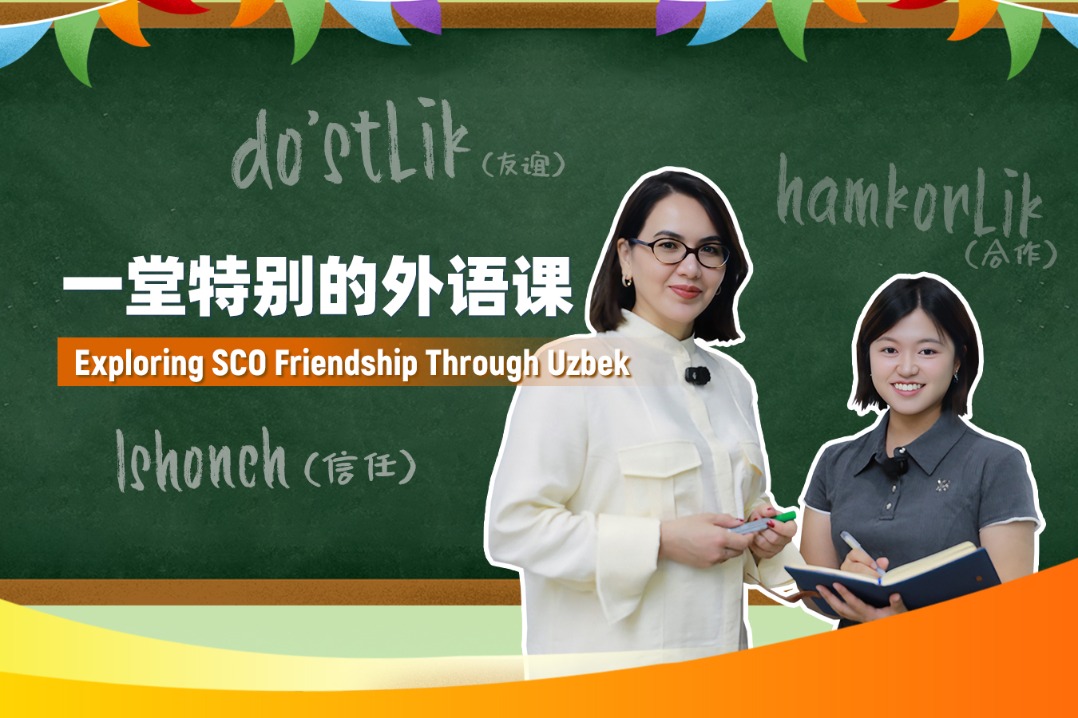Poetry lights children's imagination
Yunnan-based nonprofit embraces the power of verse to nurture students' intelligence and creativity, Yang Yang reports.

It seemed like a normal day, back in October 2016. Then the rain came. Kang Yu, a 24-yearold volunteer teacher, at Mangshui Middle School in a remote town in the mountains of Yunnan province, was teaching calligraphy to the eighth graders. Suddenly, the clouds seemed to burst and her students had a new focus of attention.
The electricity also went out, so she couldn't continue the calligraphic class. Seeing that the students were staring at the rain, almost absent-mindedly, Kang suddenly got a burst of inspiration.
She told them to go outside, under a shelter, to enjoy the rain and come back to write something, short or long, or just several lines like a poem.
Kang ran back to her dormitory to fetch her portable speaker. When she walked around the classroom holding up the red speaker-with some beautiful music on-she noticed a girl crying silently.
She came over to the girl and spotted her lines of poetry: "I am a selfish child/Wishing that when the rain stops/The sun will shed warm light only on me./I am a selfish child/Expecting that when I am sad/There can be a corner of comfort emptying for me./I am a selfish child/Hoping that mom's love only belongs to me."
"Her mother died, and I had never known before that class," Kang recalls in a phone interview with China Daily. Inspired by that class, Kang later founded Enlighten Our Future, a nonprofit organization based in Dali, Yunnan province, to help Chinese youngsters improve their mental well-being through poetry composition and appreciation.
She had been teaching at that school for over a year. She wanted to help the students improve their exam grades so that they could leave the impoverished area for university and have a better chance in life's lottery.
Like many children from remote areas, her students were shy at expressing their feelings and opinions. But sometimes, when she tried to discipline them, they challenged her by asking: "My parents don't mind, then why do you?"
"I realized that they could speak about their feelings and opinions through poetry," she says.
Kang promised the students that whenever it rained, they would go outside, shelter under the eaves, and enjoy the rain and write something. She also set a box outside her dormitory, so that students can put their written musings inside on Friday evenings. She would read them during the weekend and give her feedback the next week.
She remembers that the school's headmaster Yu Chunyun asked her a question: "If the children leave, who will be the future of the town?"
Recalling that conversation, she echoes the headmaster's statement: "The town's future will be in the hands of those kids who won't be able to leave the mountains. Their present will decide the town's future."
These children face more problems than just poverty itself. Diseases, which, due to poverty and poor medical conditions, cannot be treated properly, are also a major concern, Kang says.
They have to face other difficulties, such as the lack of parental influence because they leave to work in cities, domestic violence, struggling single parents, and adolescent emotional struggles.
"Compared with poverty and the consequential problems, the bigger difficulty for them is the lack of attention to their inner world," she says. "Confronted with so many difficulties and challenges, how can they still keep their love and curiosity for life?
"For many who will have to stay on the mountain, are they going to love their life as farmers? And when they have kids, can they enjoy the starry nights with them?"
Kang wants to help the children record the memorable moments in life and to help them express their feelings and opinions, especially when they are not happy.
"What's great about poetry is that it can help one to find a way to communicate with oneself, even if nobody listens to you," she says.
The exchanges of feelings and opinions via poetry pulled Kang closer to her students, who admired her as their "understanding elder sister" for girl students, or "the bigwig" for the boys. She received an increasing number of poems from her students, especially when they heard that she was leaving in July 2017 and would study overseas.
A volunteer's motivation
Back in the summer of 2015, when Kang was about to graduate from Renmin University of China, she had already been admitted by a research institute at the university to further study economics, but she wanted to do something else.
Since being a college student in 2011, Kang had been a volunteer teacher at primary schools for migrant workers' children in suburban Beijing. However, since 2013, she was too busy working at the research institute to continue her volunteer work.
"Then I felt something missing, and I was unhappy. When I was about to graduate, I was struggling between two choices, whether to continue as a volunteer teacher or to continue my education," she recalls.
She thought of her beloved grandmother, who had brought her up, and the days when she would sit on her lap under a big pagoda tree in the yard.
"Grandma pointed at the ants on the ground and told me: 'The ants will die when we stamp on them accidentally. Pigs, horses, cows or sheep cannot control their fate, either, but we humans can. You're endowed with such great power, so you should not only create a good life just for yourself, but also for others'," Kang recalls. "I've always followed her guidance, so I decided to give being a volunteer teacher another go."
When she was preparing for her overseas studies, she received a box of letters on Sept 10, 2017-Teachers' Day-from her students, who had continued leaving their poems in her dormitory even after she left. Then a poem changed her life.
It was by a girl called Xiao Linghua, 13, who also wrote a letter to her, in which she confided a secret: "Miss Kang, do you know that I'm not fatherless? But my father is in prison, so my mom supports us three girls on her own. When other people said that I was a fatherless child, I never fought back. However, I fought back for the first time in my life when my poem won the second prize, but some claimed that I must have plagiarized it. I said that I wrote it myself, and it was recognized by a real poet, Wang Jiaxin."
With the letter, Linghua also sent Kang a new poem of hers: "People in Heaven light the stars/People on the ground pray." Following the line of verse, the girl wrote: "I hope more children can find themselves through poetry like I did."
Kang says: "At that moment, it occurred to me that it's not that the kids can't leave me, but that I can't leave them. I want to do more."
From an idea to a campaign
In October 2017, Kang registered Enlighten Our Future as a nonprofit, and then spent three months dragging her large suitcase on the rugged mountain roads. She managed to persuade 13 schools to start the "Four-Season Poetry Lessons" project, with a teaching plan, content and method she provided.
When she returned to Mangshui Middle School at the end of 2017, Yu told Kang that he had observed an interesting phenomenon. Adolescents used to break the windows of the headmaster's office with stones when they were not satisfied with him or with the teachers, but "now they learned to write about their anger in poems", he said.
"That's how we got our slogan: They used to crack (glass), but now they create," Kang says.
By March 2018, 70 schools in the countryside had joined the program to offer poetry lessons to students.
So far, the poetry lessons designed by the nonprofit have benefited 68,000 students in 823 primary and middle schools in 24 provinces and autonomous regions around the country, mostly in poor areas. Now Enlighten Our Future is run by three full-time workers, including Kang, 60 part-time workers, 280 backups and more than 1,000 volunteers.
The poetry lessons have four themes: light in spring, shade in summer, sound in autumn, and sun in winter, "carrying our hope that poetry can become a companion for children when they grow up", Kang says.
Huan Qinghua, a 15-year-old student at Jiangyu Middle School of Weifang, Shandong province, says that poetry is a listener to whom she can tell all kinds of stories-about big trees, father, fire and love. "With it, I don't feel lonely," she says.
Dong Yue, a 40-year-old teacher with Wangjia Primary School in Hunnan district of Shenyang, Liaoning province, has been a primary school teacher for 20 years. Dong says in order to enable students to get more from class, she started the poetry lessons in 2018. She found that the course can help to ignite children's imagination, broaden their mind, improve their Chinese language skills and increase their confidence, she says.
Yang Deli, 32, is a Chinese language teacher for sixth graders at Dashantou (literally meaning "big mountain head") Primary School, Mingde village, Mangshui town of Changning county, Yunnan province. As a lover of poetry, she sees the poetry lessons as a good aesthetic education for children in the countryside, "most of whose parents leave home for jobs in cities", she says.
Giving recognition
Middle school student Qinghua says, from the poetry lessons, she has learned how to appreciate beautiful things and how to express her feelings about them in vivid and beautiful language, adding that she was proud of her poem, Marrying the Wind: "Many times/Had the wind kissed the bud/Before she put on her bridal veil/Shyly marrying him."
For Li Yaolin, 15, another high school student in Changning county, Yunnan province, poetry has helped him to rediscover himself, and has become an important part of his life.
Yaolin says: "Through poetry, I've learned to be brave and tough, gradually getting rid of my timid self. Now I dare to try new things, to express myself, and to step outside of the cage where I used to be.
"When I feel lost and helpless, I will turn to poetry. It's the voice inside my heart, accompanying me through those difficult periods of time."
He gives one of his poems as an example titled I Didn't Give Flower Milk: "Sister Flower was born/Her mouth wide open/Asking me for milk/For her mother died last winter/I didn't give her milk/I told her to be a brave flower/Just like me, the brother/I also told the younger flowers/Don't pretend weakness/Only when you grow bigger/Will others bend down/To smell your fragrance."
For students of this age, the most important thing about poetry is that it encourages them to express themselves candidly, so that teachers and parents can understand them better, Yang says.
"We want to present the other facets of these children from poor areas-not just pathetic poverty," Kang says. "You can find beauty and power in their inspirational poems. What they need is not sympathy, but recognition, which I think will influence their whole life."





Today's Top News
- Xi inspects manufacturing company in Shanxi
- Xi pays tribute to martyrs in resistance war against Japanese aggression
- Remembering past for the sake of the future: China Daily editorial
- Steps taken against EU medical device curbs
- It's time Japan faced its war crimes and militarist past
- China's sacrifices should always be remembered






























